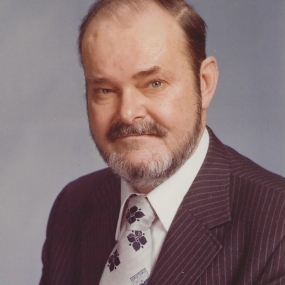Dr John James Lloyd Ablett

22/11/1915 to 19/02/1997
Place of birth: Cairo
Nationality: British
CRN: 558091
Education and qualifications
|
General education |
Medical student training at King’s College Hospital, London 1933-39 |
|---|---|
|
Primary medical qualification(s) |
MRCS LRCP 1939 |
|
Initial Fellowship and type |
FFARCS by Election |
|
Year of Fellowship |
1953 |
|
Other qualification(s) |
DA (RCP&S), 1947 |
Professional life and career
Postgraduate career
Following medical school he undertook house jobs at Horton Emergency Hospital and entered the EMS. In 1941 he was commissioned Lieutenant in the RAMC, beginning war service in Europe and North Africa before entering into the Italy campaign. He attained the rank of Captain and was graded Anaesthetist in the RAMC.
On returning to England after the war he passed the Diploma in Anaesthetics in 1947 while working at King’s College Hospital in London (and possibly Guy’s Hospital as well). Next he was senior anaesthetic registrar at the Royal Free Hospital and Hampstead General Hospital. According to the electoral register he was living in Islington, London with his wife during this period.
According to his son Andrew, Dr Ablett had a profound interest in anaesthesia. He transferred to the Leeds General Infirmary in 1951 where he was appointed as a consultant anaesthetist, later becoming a senior consultant.
He retired prematurely in 1975 at the age of sixty as a consequence of a motor accident which left him with quite significant head injuries.
Professional interests and activities
Whilst at Leeds, he developed an interest in the management of tetanus, developing one of the three specialist centres in the UK for treatment. He was also one of the pioneers of the developing field of Intensive Care Medicine. During his career he was asked by the Leeds Health Authority to develop a new intensive care unit at Leeds General Infirmary, Ward 21, which became one of the early established units in the country. In 1956 Ablett published a substantive review article about the management of tetanus and the role of the anaesthetist. At a Symposium in 1967 he proposed the Ablett Scale for grading the severity of tetanus, which is still quoted today. He also regularly lectured the medical students upon the topic.
He has been described as “the father of intensive care” in Leeds. During his professional career Dr Ablett was highly respected by his medical colleagues and additionally, according to his son, was a person who liked to see things completed. He was asked to lecture on the topics of tetanus and intensive care on numerous occasions across the country.
He was President of the Yorkshire Society of Anaesthetists for 1972-73.
Other biographical information
John James Lloyd Ablett was born in Cairo, Egypt where his father was working as an engineer for the Egyptian railways. Apparently John first met his future wife Lilla Thurza Crichton whilst he was training at King’s, where she was training as a physiotherapist. They both enlisted to support the war effort. Both served in Europe and North Africa and again met in Northern Italy. From this point onwards they were able to keep in touch with one another and shortly after the war, married in Rome on 23rd August 1945, honeymooning in Northern Italy, Venice and the surrounding areas.
Dr Ablett’s main hobbies were gardening, carpentry and a rather complex electric train set which took up two full rooms in the attic of the family home in Leeds. Here, he and his two sons spent many happy hours together “playing trains”, which Andrew recalls, was much to the dismay and irritation of the boys’ mother with innumerable spoiled family meals.
In the garden, his love of roses was immense and many hours were spent tending the flower beds and vegetable gardens; they even had free range chickens for a few years whilst rationing was in effect after the war. As retirement continued his interest in gardening further developed, especially with roses.
Dr Ablett and his wife moved to Filey, North Yorkshire in 1978. But the consequences of his earlier injuries resulted in deteriorating mental health necessitating his admission to The Retreat at York, where he was affectionately known as “Dr John”. The family were extremely grateful to all the staff at The Retreat for providing him with superb nursing care for his last 10 years or so. Dr Ablett passed away on 19th February 1997 aged 81yrs.
He was survived by his wife Lilla Thurza and his two sons Andrew (b. 1950) and David (b. 1952) with six grandchildren.
David (d. 2015) followed his father into medicine and anaesthesia after obtaining his medical degree at Leeds in 1976, and became an Associate Professor in Calgary, Canada. Andrew’s career took him into senior personnel management after an initial apprenticeship in the car manufacturing industry.
Author and sources
Author:
Dr Innes Simon Chadwick
Sources and comments:
London Gazette Supplement 16 May 1941 p2799 accessed.
Sen. Anaesth. Regist. Roy. Free Hosp. & Hampstead Gen. Hosp. Medical Directory 1952.
UK Medical Register 1959 accessed via Ancestry.com
Biographic information accessed via Ancestry.com
Yorkshire Society of Anaesthetists website accessed .
Information provided via private email correspondence: Alistair McKenzie, Oct. 2023.
Substantive family information and photograph kindly provided by surviving son, Andrew Ablett with correspondence and a video discussion, Oct. & Nov. 2023.
Ablett JJL, Dawkins CJ Massey, Steel GC. Extradural block with xylocaine, a preliminary report. Anaesthesia 1951; 6: 159-63.
Ablett JJL. Tetanus and the Anaesthetist. British Journal of Anaesthesia 1956; 28: 258-73.
Toothill C, Dykes JRW, Ablett JJL. Urinary catecholamine metabolite concentrations in tetanus.
British Journal Anaesthesia 1970; 42: 524-30.
